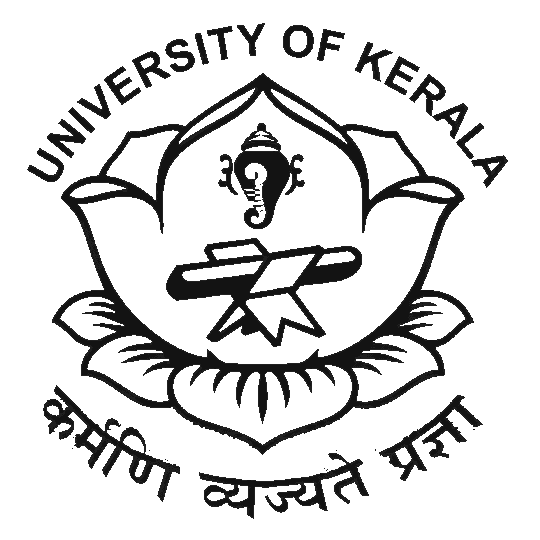
Kerala University

Chithira Thirunal Balarama Varma (Founder)
Summary
The University of Kerala, originally known as the University of Travancore, is a renowned state-run university situated in Thiruvananthapuram, Kerala, India. It was established in 1937 under the patronage of the Maharajah of Travancore. It has a special place in Kerala's educational system because it was one of the nation's first universities. Over 150 associated colleges make up the university, which is overseen by the governor of the state's Chancellorship and offers a wide variety of undergraduate, graduate, MPhil, and PhD programmes through sixteen faculties and forty-three teaching and research-focused departments. The university is a major force in influencing the intellectual and socioeconomic growth of the area because of its strong academic programme and uncompromising dedication to quality.
The Kerala University Library, established in 1942, stores around 3.5 lakh books and 1000 bound volumes of journals. It is an inventory for UN and World Bank publications and offers access to over 9000 online articles. The university is accredited by NAAC with the highest grade of A++ and maintains rigorous scholarship and research standards, evidenced by its exceptional NAAC score of 3.67 out of 4. The first world Malayalam Conference was organised by the University of Kerala in 1977.
History
The University of Kerala's inception in 1937 marked a significant milestone in the educational landscape of the region. Formerly known as the University of Travancore, it was established through a proclamation by Maharajah Sri ChithiraThirunal Balarama Varma, with Sir CP Ramaswamy Ayyar serving as its first Vice-Chancellor. Modelled after renowned British universities, the institution aimed to emulate the academic standards and practices of its Western counterparts.
The university's origins can be traced back to two pioneering institutions in Kerala: the University College, Thiruvananthapuram, and the Trivandrum Observatory. The former, founded as the Maharaja's Free School in 1834, evolved into a college affiliated with Madras University by 1866. Meanwhile, the Trivandrum Observatory, established in 1838 under the directorship of John Caldecott FRS, contributed to scientific advancements in the region.
As Kerala's educational landscape evolved, the University of Travancore expanded its jurisdiction, affiliating with ten colleges previously under Madras University. However, the formation of the unified state of Kerala in 1954 prompted a reconfiguration, leading to the enactment of the Kerala University Act in 1957, which renamed the institution the University of Kerala.
Over the years, the university witnessed substantial growth, establishing campuses in Thiruvananthapuram, Ernakulam, and Kozhikode. However, subsequent developments, such as the emergence of independent universities like Calicut University and CUSAT, led to a reduction in the University of Kerala's territorial jurisdiction.
Today, the University of Kerala stands as a beacon of academic excellence, with sixteen faculties, forty-four departments, and numerous research centres and study centres. Its commitment to postgraduate, MPhil, and doctoral programs, along with initiatives in distance education, reflects its dedication to knowledge dissemination and academic advancement.
Notable figures associated with the university include scholars trained under eminent mentors like Sir C. V. Raman, Prof S R Ranganathan, and Prof Benjamin Bloom, alongside esteemed faculty members such as poet K Ayyappa Panciker and Oriental Studies scholar T Ganapathi Sasthri.
Furthermore, the university's extensive network of affiliated colleges, totalling over 180 institutions, underscores its role in shaping the educational landscape of Kerala. While the university's primary functions include prescribing courses, conducting examinations, and issuing certificates, its affiliated colleges form an integral part of its academic ecosystem.
In recognition of its contributions to education and research, the University of Kerala has garnered numerous accolades over the years. These include being identified by the University Grants Commission for promoting India Studies among foreign students and receiving an 'A++' grade from the National Assessment and Accreditation Council.
Courses
The University of Kerala offers a diverse range of courses designed to cater to the academic and professional aspirations of students. With sixteen faculties and forty-four departments, the university provides comprehensive programmes in the fields of Arts, Science, Commerce, Management, Law, Engineering, and Technology, among others. At the undergraduate level, the University of Kerala offers traditional bachelor's degrees as well as specialised courses through its University Colleges of Teacher Education (UTEC) and University Institutes of Technology (UIT). These include B.Ed programmes aimed at aspiring educators and B.Sc courses in Computer Science, Information Technology, Electronics, and Business Administration, which prepare students for careers in technology and business sectors.
The postgraduate offerings at the University of Kerala are equally robust, with a wide array of master's programmes across various disciplines. These programmes are designed to deepen subject knowledge and develop research skills. For those seeking advanced academic pursuits, the university offers MPhil programmes, which are typically one-year research-focused degrees, and extensive PhD opportunities across numerous fields. These doctoral programmes are supported by the university's research centres and affiliated colleges, which provide an environment conducive to scholarly research and innovation.
In addition to traditional degree programmes, the University of Kerala has established several specialised study centres that offer courses in emerging and interdisciplinary fields. These centres focus on areas such as Nano-technology, Bioinformatics, Women's Studies, Kerala Studies, Learning Difficulties, Sree Narayana Studies, and Gandhian Studies. They provide certificate, diploma, master's, and PhD programmes, thereby catering to a broad spectrum of academic interests and societal needs.
The Institute of Distance Education (IDE) further extends the university’s reach, offering undergraduate and postgraduate programmes to over 10,000 students nationwide and internationally. This ensures that higher education is accessible to those who cannot attend regular classes, reinforcing the university’s commitment to inclusive education.
Global MBA rankings
- Ranked between 1051-1100 in the QS Sustainability Ranking 2024.
- According to the QS World University Rankings for 2023, the University of Kerala was placed between 451-500 in the Asia region.
- In the QS World University Rankings for Southern Asia 2023, it achieved a commendable rank of 125.
Job integration rate
In the engineering sector, the highest placement package reaches 36 LPA, while the average package for architecture students is 12 LPA. Nearly 80 per cent of students secure employment annually.
General information
- A Brief History of the University| Kerala University
- University of Kerala| Instagram
- University of Kerala| Wikipedia
- Kerala University: Admission 2024, Courses, Fees| Shiksha
- Kerala University: Admissions 2024, Courses, Fees, Cutoff| Collegedunia
- Kerala University, Thiruvananthapuram| Linkedin
- University of Kerala | World University Rankings | Times Higher Education
- University of Kerala : Rankings, Fees & Courses Details| Top Universities
Explore the latest data on Business, Industry Leaders and Influencers, Organizations, Education, and Investors to stay informed and ahead.

Chithira Thirunal Balarama Varma (Founder)
